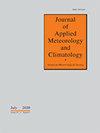利用ARM SGP站点的观测资料评估HRRR天气模式中的近地表变量
IF 2.2
3区 地球科学
Q3 METEOROLOGY & ATMOSPHERIC SCIENCES
引用次数: 0
摘要
利用NOAA高分辨率快速刷新(HRRR)数值天气预报模式第4版,在南方大平原(SGP)地区对风、湿度、温度、地表潜热通量和感热通量、长波和短波辐射通量等近地表变量进行了测试。该研究评估了该模型相对于不同时间尺度上的观测结果的偏差和偏差校正后的平均绝对误差。5个SGP站点的近地表地球物理变量预报(3 km尺度的HRRR)与观测值吻合较好,但也存在一些一致的观测预报差异。感热通量和潜热通量是最难重现的变量。日循环是影响近地表变量观测预报差异的主要时间尺度,几乎所有变量在整个日循环中都表现出不同的偏差。结果表明,对短波向下辐射通量的高估和对长波向下辐射通量的低估是本研究发现的两大偏差。由于模式表示、数据同化限制以及HRRR和SGP站点之间尺度的差异,向下长波通量、风速、感热通量和潜热通量的时间和大小也有所不同。短波向下的正偏压和长波辐射的负偏压表明该模式低估了研究区域内的云分数。该研究通过与HRRR版本3的简短比较得出结论,并表明版本4在几乎所有近地表变量中都具有更好的性能。本文章由计算机程序翻译,如有差异,请以英文原文为准。
Evaluation of the near-surface variables in the HRRR weather model using observations from the ARM SGP site
The performance of version 4 of the NOAA High-Resolution Rapid Refresh (HRRR) numerical weather prediction model for near-surface variables, including wind, humidity, temperature, surface latent and sensible fluxes, and longwave and shortwave radiative fluxes, is examined over the Atmospheric Radiation Measurement (ARM) Southern Great Plains (SGP) region. The study evaluated the model’s bias and bias-corrected mean absolute error relative to the observations on different time scales. Forecasts of near-surface geophysical variables at five SGP sites (HRRR at 3-km scale) were found to agree well with observations, but some consistent observation-forecast differences also occurred. Sensible and latent heat fluxes are the most challenging variables to be reproduced. The diurnal cycle is the main temporal scale affecting observation-forecast differences of the near-surface variables, and almost all of the variables showed different biases throughout the diurnal cycle. Results show that the overestimation of downward shortwave and the underestimation of downward longwave radiative flux are the two major biases found in this study. The timing and magnitude of downward longwave flux, wind speed, sensible and latent heat fluxes are also different with contributions from model representations, data assimilation limitations, and differences in scales between HRRR and SGP sites. The positive bias in downward shortwave and negative bias in longwave radiation suggests that the model is underestimating cloud fraction in the study domain. The study concludes by showing a brief comparison against version 3 of the HRRR, and shows that version 4 has better performance in almost all near surface variables.
求助全文
通过发布文献求助,成功后即可免费获取论文全文。
去求助
来源期刊
CiteScore
5.10
自引率
6.70%
发文量
97
审稿时长
3 months
期刊介绍:
The Journal of Applied Meteorology and Climatology (JAMC) (ISSN: 1558-8424; eISSN: 1558-8432) publishes applied research on meteorology and climatology. Examples of meteorological research include topics such as weather modification, satellite meteorology, radar meteorology, boundary layer processes, physical meteorology, air pollution meteorology (including dispersion and chemical processes), agricultural and forest meteorology, mountain meteorology, and applied meteorological numerical models. Examples of climatological research include the use of climate information in impact assessments, dynamical and statistical downscaling, seasonal climate forecast applications and verification, climate risk and vulnerability, development of climate monitoring tools, and urban and local climates.

 求助内容:
求助内容: 应助结果提醒方式:
应助结果提醒方式:


